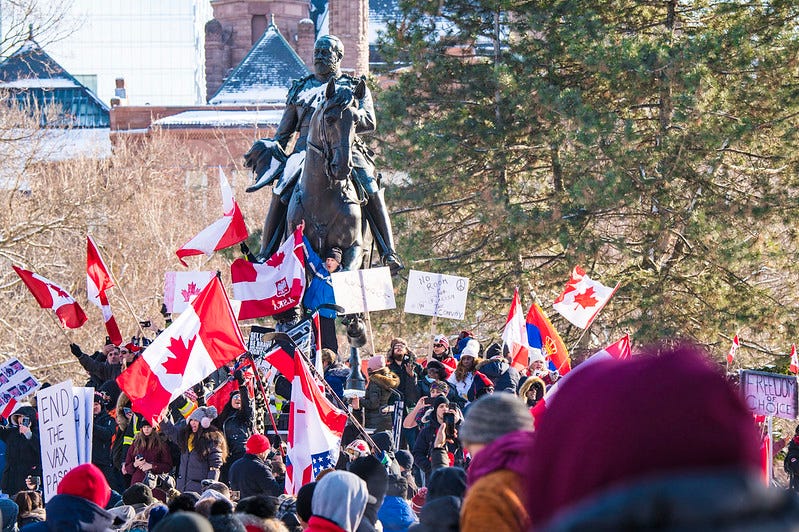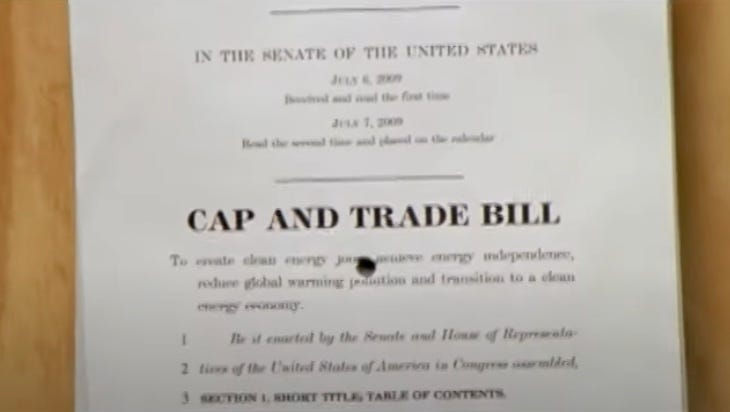The political backlash against climate solutions is just beginning; plus, Super Bowls and wildfires
Welcome to Callaway Climate Insights. And especially to our new subscribers and renewals. Please enjoy and share with your colleagues.
To read all our insights, news and in-depth interviews, please subscribe and support our great climate finance journalism. Callaway Climate Insights publishes Tuesdays and Thursdays for everybody.

At first glance, the Siege of Ottawa started by truckers outside the Canadian Parliament two weeks ago was just another protest against Covid mandates. Over the past several days it has grown to something much more, both threatening the Canadian government and potentially spreading to the U.S.
So much so, that former Bank of Canada (and Bank of England) Gov. Mark Carney labeled it sedition in an editorial this week; an insurrection requiring police and military power to put an end to it.
Carney is, of course, one of the finance industry’s global leaders in pushing banks and monetary authorities to fight climate change, which over the past two years has ridden a parallel wave of global threat and political backlash alongside the pandemic. Now, just as the first real signs of a dangerous, new environment start to roil the way we all live, a political uprising against climate solutions is beginning to take place.
It started in Washington, where President Joe Biden’s Build Back Better plan was held hostage by a coal baron in his own party. It’s spread to the states, where some legislators are trying to prevent pension funds from working with any Wall Street entities that support a transition to renewable energy from oil and gas.
It’s spreading to the UK, where a group of Tory members of Parliament are working to upend Prime Minister Boris Johnson’s green agenda by blaming a Europe-wide fuel shortage on renewable energies, such as they did in Texas last year. It’s making its way to the Supreme Court, which hears a landmark case at the end of this month on whether the Environmental Protection Agency should have the power to regulate Greenhouse gases as pollutants.
And it’s reportedly stalling an already delayed move by the Securities and Exchange Commission to publish climate disclosure rules for public companies, amid concern anything too harsh will be sent to the courts and overturned.
The political war on climate solutions is only just beginning. Biden’s entire climate agenda — everything we can do to prevent global warming this decade — is hanging in the balance. It will be a key component of the midterm elections. And while it’s not yet an open insurrection as we see in Canada, we already know the damage party politics can do here in the U.S. to a working Democracy.
The battle has shifted from denial to defense. Like it or not, the worse climate change gets the more ferocious politics will become. Here and everywhere.
More insights below. . . .
Don’t forget to contact me directly if you have suggestions or ideas at dcallaway@callawayclimateinsights.com.
EU notebook: Turkey, Israel in unlikely natural gas alliance

. . . . Energy shortages and politics make strange bedfellows, none more unusual than Turkey and Israel coming together this week with an alliance to carry Israeli gas to Europe through Turkey, writes Elizabeth Hearst from Dublin. Turkish President Recep Tayyip Erdoğan said he also expected the two countries to discuss deeper cooperation at a summit in March. The surprising talks come as Europe struggles to find new sources of natural gas to compensate for what could be a pipeline shutdown by Russia should it invade Ukraine and get hit with sanctions. . . .
The $550 billion question: Can Build Back Better’s climate provisions be revived?

. . . . The shadow of former President Barack Obama’s failed Cap and Trade bill more than a decade ago looms large in Washington this week as Biden struggles to find a way to revive the $550 billion climate provisions in his stalled (dead?) Build Back Better legislation, writes Bill Sternberg in Washington. With Biden’s entire climate agenda at stake, as the countries moves toward midterm elections, the political situation looks strikingly similar to the way it did in 2009 and 2010, when West Virginia’s Joe Manchin, a candidate for Senate at the time, promised to blow a hole in Cap and Trade. Will history repeat itself? . . . .
Thursday’s subscriber insights: Record heat and wildfires greet Los Angeles Super Bowl

. . . . Record heat and a rare February brush fire greeted Super Bowl fans in L.A. this week as the unrelenting climate change that has gripped California in the past few years made its presence known for the Big Game. Just as the potential snowy locations for the Winter Olympics are dwindling worldwide as global warming bites, so too will future warm-weather Super Bowl locations. Green Bay, anyone? Read more here. . . .
. . . . The Biden administration’s $5 billion plan to install a charging station “spine” on interstate highways across the U.S. is attracting lots of competition, including from other countries. As Australia-based Tritium begins manufacturing in Tennessee, the race for position, both statewide and nationwide, is starting to get crowded. Read more here. . . .
. . . . One downside to electric vehicles is that it takes longer to charge them up than to fill up a gas tank. But that’s an upside for gas stations if they add charging stations or charging stations alone — they have more time to sell stuff like soda, snacks and so forth. And entrepreneurs are already on it. Read more here. . . .
. . . . Cervest, the London-based climate intelligence service, said today that Carol Browner, the former EPA Administrator and Director of the Obama Administration's White House Office of Energy and Climate Change Policy has joined its climate tech Climate Intelligence Council (CIC). Cervest’s first product, which can track climate past and forecast future for a physical asset such as a hotel or hospital, is in testing and expected to debut later this year. . . .
. . . . Galvanize Climate Solutions, the investment and partnerships platform launched six months ago by Katie Hall and Tom Steyer, is beefing up its executive ranks with several key recent hires. Following the appointment of Nicole Systrom last month as chief impact officer, the operation today announced it hired Sachi Blue-Smith as chief people officer and Kacy Gerst as chief science and technology officer. The hires are in keeping with Galvanize’s goals to build a multi-purpose finance platform that finances, trains, and supports climate entrepreneurs all the way through their growth cycle. . . .
Editor’s picks: Leaders take a dip in One Ocean summit, while IEA is urged to tear down that paywall
Watch this video from NASA Goddard: 2021 was tied for the sixth warmest year on NASA’s record, stretching more than a century. But, what is a temperature record? GISTEMP, NASA’s global temperature analysis, takes in millions of observations from instruments on weather stations, ships and ocean buoys, and Antarctic research stations, to determine how much warmer or cooler Earth is on average from year to year. Stretching back to 1880, NASA’s record shows a clear warming trend.
World leaders in France for ocean summit
The One Ocean summit convened Wednesday in the French port of Brest, with as many as 40 world leaders coming together to focus on illegal fishing, decarbonization for shipping and ocean pollution reduction. The Guardian quotes the event organizer, Olivier Poivre d’Arvor, as saying the group seeks to make “ambitious and concrete commitments,” and to generate “unprecedented international political engagement.” The three-day summit “will also focus on efforts to improve governance of the high seas and coordinate international scientific research,” according to the report.
International Energy Agency urged to take down paywalls
Activists and academics are asking the International Energy Agency to take down its subscription paywall and make data free to all, according to a report from Inside Climate News. The agency, which publishes reports on global energy issues, charges almost $18,000 a year for a full subscription. The report says the IEA’s data is critical for researchers who are focused on climate change, and “experts say the 30 member countries that make up the IEA’s governing board — including the U.S., Germany and a number of the world’s wealthiest nations — can afford the fees, but for independent researchers or less wealthy countries, IEA paywalls are a major roadblock to climate-related research efforts.”
Latest findings: New research, studies and projects
Climate solution companies’ performance
As more companies provide products and services to help reduce carbon emissions in the economy, the authors of this Harvard Business School Accounting & Management Unit working paper titled Climate Solutions Investments develop a methodology to identify those companies and create a sample of publicly listed climate solutions companies allowing us to study their geographic composition, accounting fundamentals, valuation ratios, and stock performance over time. The sample is equally split between developed and emerging markets with more companies located in China rather than the U.S. or the EU. In the abstract, the authors note, “A portfolio of climate solutions companies exhibits higher revenue growth, higher investments in research and development, and talent and lower profitability margin. The portfolio exhibits superior stock market performance since 2018, driven by solutions in energy, fuels, battery, and transportation. Finally, the portfolio’s returns exhibit very little correlation with the returns of portfolios that seek to reduce their carbon emissions by underweighting high carbon emission companies, suggesting that climate solutions portfolios are distinct from low carbon emission indices.” Authors: Alexander Cheema-Fox, State Street Associates; George Serafeim, Harvard Business School; Hui (Stacie) Wang, State Street Associates.
More of the latest research:
Words to live by . . . .
“Climate change isn’t an ‘issue’ to add to the list of things to worry about, next to healthcare and taxes. It is a civilizational wake-up call. A powerful message — spoken in the language of fires, floods, droughts, and extinctions — telling us that we need an entirely new economic model and a new way of sharing this planet. Telling us we need to evolve.” — Naomi Klein, Canadian author and activist.



